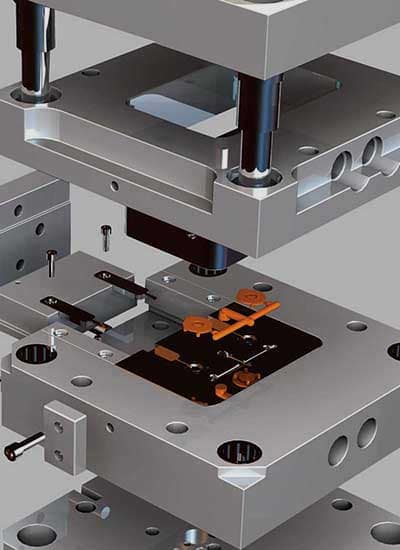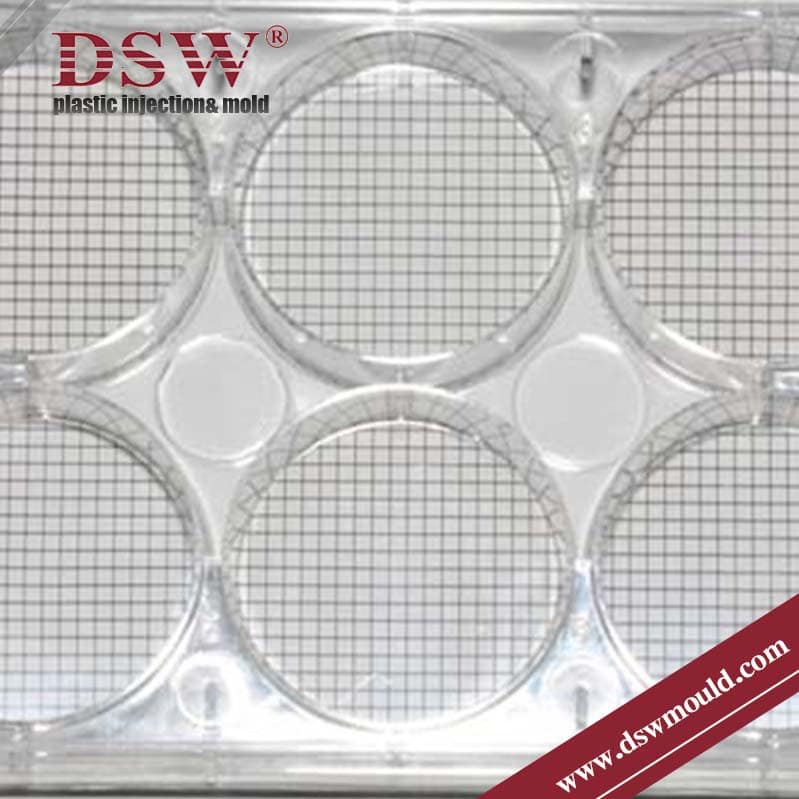Steel Grades
Several grades of mold steels are available, each with its properties and advantages. Commonly used grades include:
P20 (Plastic Mold Steel): Versatile and widely used for general-purpose molding applications.
H13 (Hot Work Tool Steel): Offers excellent hardness, toughness, and thermal fatigue resistance, suitable for high-volume production and demanding applications.
S136 / 1.2083 (Stainless Steel): Provides good corrosion resistance and polishability, often used for molding optical and transparent parts.
NAK80 / P21 (Pre-Hardened Plastic Mold Steel): Offers good machinability and dimensional stability, suitable for precision molding applications.
718 (Austenitic Stainless Steel): Provides high corrosion resistance and polishability, commonly used for molding medical and optical parts.
| GB | ASTM | DIN | ISO | JIS | ASSAB |
| 4Cr13 | 420F | 1.4031 | X39Cr13 | ||
| 3Cr2MnNiMo | 1.2738 | 40CrMnNiMo8-6-4 | 718 | ||
| 3Cr2Mo | P20 | 1.2311 | 35CrMo7 | 618 | |
| SM45 | 1045 | 1.0503 | C45 | S45C | |
| SM50 | 1050 | 1.054 | C50 | S50C | |
| SM55 | 1055 | 1.0535 | C55 | S55C | |
| T8 | W1A-8 | 1.1525 | C80U | SK80 | |
| T10 | W1A-91/2 | 1.1545 | C105U | SK105 | |
| 20Cr | P2 | SCr420 | |||
| 12CrNi3 | 1.2735 | ||||
| 20Cr2Ni4 | P21 | 1.2764 | |||
| 2Cr13 | 420 | 1.4021 | X20Cr13 | SUS420J1 | |
| 9Cr18 | 440C | 1.2361 | SUS440C | ||
| 3Cr17Mo | 1.2316 | ||||
| 3Cr17NiMoV | 1.4122 |
The properties and benefits of P20, H13, and S136 steel grades:
P20 Steel
Alloy: Low-alloy steel
Key Properties:
Machinability: Excellent – Enables efficient and cost-effective mold production.
Polishability: Good – Achieves smooth surface finishes required for many molds.
Toughness: Moderate – Offers decent resistance to cracking and deformation under stress.
Strength: Moderate – Provides sufficient strength for various applications but may not be suitable for highly high-stress environments.
Benefits:
Cost-Effectiveness: Relatively inexpensive, making it ideal for prototypes and low-volume production runs.
Versatility: Well-rounded properties make it suitable for a wide range of applications in molds, tools, and structural components.
Ease of Machining: Enables efficient mold production with minimal machining issues.
H13 Steel
Alloy: Hot Work Tool Steel
Key Properties:
Hot Hardness: Excellent – Retains hardness at elevated temperatures, ideal for hot forging and die casting molds.
Wear Resistance: Excellent – Resists wear and tear exceptionally well, ensuring mold longevity in high-volume production runs.
Toughness: Moderate – Offers a good balance between hardness and toughness for hot work applications.
Dimensional Stability: Maintains shape well at high temperatures, reducing warping or cracking risks in molds.
Benefits:
Durability: Excellent for long production runs and applications with high wear and tear.
Dimensional Stability: Minimizes mold distortion during hot work processes.
Hot Work Performance: Ideal for molds used in hot forging, die casting, and other hot work applications.
S136 Steel
Alloy: Stainless Steel
Key Properties:
Corrosion Resistance: Excellent – Superior resistance to rust and corrosion, suitable for harsh environments.
Machinability: Good – Can be machined relatively quickly into desired shapes.
Surface Hardness (after Nitriding): High – Nitriding process creates an extremely hard surface, improving wear resistance.
Fatigue Strength: Good – Withstands repeated stress without breaking, making it suitable for components under cyclic loading.
Benefits:
Corrosion Resistance: Ideal for parts exposed to moisture, chemicals, or other corrosive elements.
Enhanced Wear Resistance (after Nitriding): Well-suited for gears, shafts, and bearings requiring high wear resistance.
Suitability for Harsh Environments: Corrosion and wear resistance make it ideal for applications in marine environments, chemical processing plants, and other demanding conditions.
Below is a detailed comparison table highlighting the key differences between P20, 2738, H13, and S136 steel grades, which are widely used in mold-making, tool-making, and engineering applications:
| Steel Grade | Composition (Key Elements) | Hardness (HRC) | Toughness | Corrosion Resistance | Machinability | Applications |
| P20 | ~0.4% C, 1.5–2.0% Mn, 1.0–1.4% Cr, 0.3–0.6% Mo | 28–35 (pre-hardened) | Good | Low | Excellent | Plastic injection molds, die-casting dies for non-ferrous alloys, base plates. |
| 2738 | Similar to P20 but with ~0.4–0.6% Ni for improved hardness consistency and toughness. | 28–35 (pre-hardened) | Very Good | Low | Good | Large molds, automotive parts, molds requiring high polish and strength. |
| H13 | ~0.4% C, 1.0% Si, 5.0% Cr, 1.5% Mo, 1.0% V | 40–55 (heat-treated) | Excellent | Moderate | Moderate | Hot-work tooling, die-casting dies, extrusion dies, forging dies, plastic molds subjected to high heat. |
| S136 | ~0.4% C, 13% Cr, small amounts of Si and Mo | 48–52 (heat-treated) | Moderate | Excellent (stainless steel) | Moderate | High-polish plastic molds, medical equipment molds, optical molds, applications requiring corrosion resistance. |
Selection Considerations:
The choice between these steels depends on your specific application’s requirements. Here’s a brief guide:
P20: Cost-effective option for prototypes, low-stress applications, and molds with suitable machinability needs.
H13: Ideal for high-temperature and high-wear environments like hot forging and die casting molds.
S136: Excellent choice for components requiring superior corrosion resistance and wear resistance, particularly after nitriding.
How to Choose Plastic Mold Steel?
Understand the specific requirements of your plastic injection molding project. Consider factors such as the type of plastic resin to be molded, the expected production volume, part complexity, surface finish requirements, and environmental conditions.
Material Properties
Select plastic mold steel with properties that align with your project requirements. Fundamental properties to consider include:
Hardness: Choose steel with appropriate hardness to withstand moulding without deforming or wearing out prematurely.
Wear Resistance: Look for steels with high wear resistance to maintain dimensional stability and prolong tool life.
Toughness: Opt for steel grades that offer good toughness to withstand impact and prevent cracking or chipping during use.
Corrosion Resistance: Consider the corrosive nature of certain plastic resins and select mold steels with adequate corrosion resistance to prevent degradation over time.
Thermal Conductivity: Higher thermal conductivity can aid in efficient cooling and reduce cycle times, but it should be balanced with other properties.
Polishability: For parts requiring a smooth surface finish, choose a highly polished steel to achieve the desired aesthetic.
Optimizing Cost-Effectiveness
Evaluate the selected mold steel’s overall cost-effectiveness, considering factors such as initial material cost, tooling and machining expenses, maintenance requirements, and expected tool life. Balancing upfront costs with long-term performance and productivity can help optimize the overall project cost.
By carefully considering these factors and selecting the most suitable plastic mold steel for your specific application, you can ensure optimal performance, durability, and quality in your plastic injection molding process.













No comment